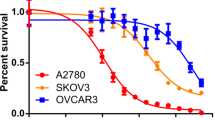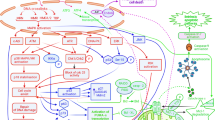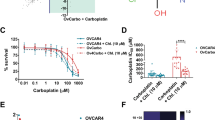Abstract
The pharmacological interest in lonidamine is related to its ability to enhance the cytotoxic effects of several DNA-damaging anti-tumour agents. This study was undertaken to better understand the in vivo interaction between lonidamine and cisplatin in the treatment of human tumour xenografts, including three carcinoma models characterized by a different responsiveness to cisplatin, in spite of the presence of a wild-type p53 gene in all tumours. The drug combination was more effective in tumour growth inhibition than cisplatin alone against MX-1 breast carcinoma and A2780 ovarian carcinoma, both highly responsive to cisplatin, whereas no influence of ionidamine was observed on anti-tumour activity of cisplatin in the treatment of the relatively resistant IGROV-1 ovarian carcinoma. As cisplatin activity is related to induction of apoptosis, the modulation of drug-induced apoptosis by lonidamine was investigated. Under conditions in which lonidamine itself had negligible effects on tumour growth and apoptosis, the modulating agent stimulated the apoptotic response induced by cisplatin in the responsive but not in the resistant tumours. Tumour response was dependent not only on the drug activation of apoptosis, but mainly on the persistence over time of the event. In the breast carcinoma MX-1, hypersensitive to cisplatin and to the lonidamine+cisplatin combination, the efficacy of drug treatment was associated with phosphorylation of bcl-2 followed by down-regulation of the protein. Lonidamine itself caused a delayed phosphorylation of bcl-2. These results are consistent with the interpretation that lonidamine is effective in modulating biochemical factors involved in regulation of apoptosis.
This is a preview of subscription content, access via your institution
Access options
Subscribe to this journal
Receive 24 print issues and online access
$259.00 per year
only $10.79 per issue
Buy this article
- Purchase on Springer Link
- Instant access to full article PDF
Prices may be subject to local taxes which are calculated during checkout
Similar content being viewed by others
Author information
Authors and Affiliations
Rights and permissions
About this article
Cite this article
De Cesare, M., Pratesi, G., Giusti, A. et al. Stimulation of the apoptotic response as a basis for the therapeutic synergism of lonidamine and cisplatin in combination in human tumour xenografts. Br J Cancer 77, 434–439 (1998). https://doi.org/10.1038/bjc.1998.69
Issue Date:
DOI: https://doi.org/10.1038/bjc.1998.69



